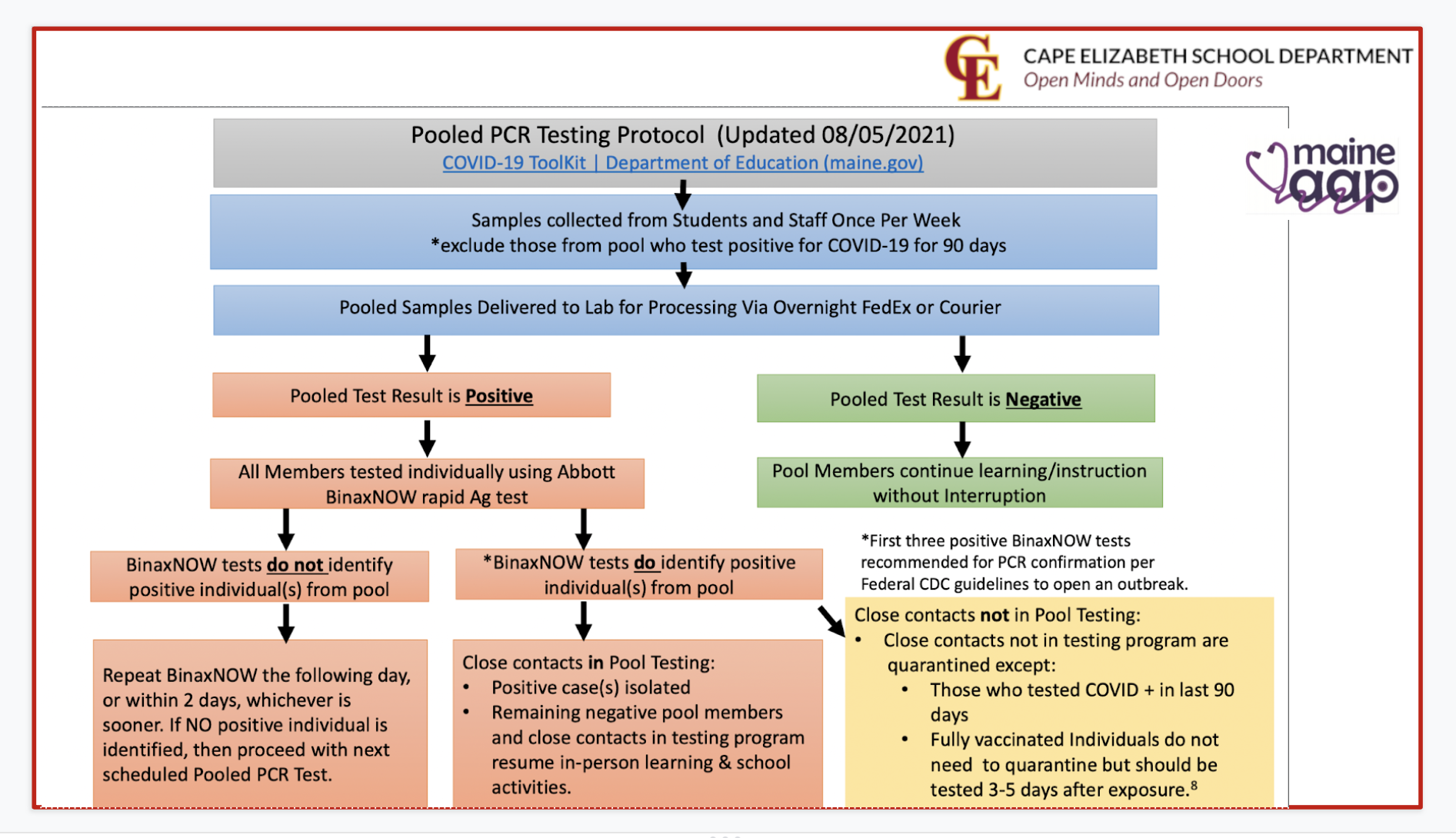Published on August 17, 2021

During their first, in-person School Board meeting since the beginning of the pandemic, the School Board voted 4-0 on Tuesday, August 16, 2021, in favor of approving new COVID-19 Mitigation Measures for the 2021-2022 school year. The approved measures were presented by Cape Elizabeth Middle School Nurse Jill Young. Young, along with 30-plus stakeholders, is a participant of the District Planning Team. On August 4 and August 12 the team met via remote video conference to review recent recommendations coming from the Director of the Maine Centers for Disease Control and Prevention Dr. Nirav Shah, the federal level of the Centers for Disease Control and Prevention, the Cape Elizabeth School Department physician Dr. Smita Sonti, and the Cape Elizabeth School Department nurses. Supported by the American Academy of Pediatrics and the Centers for Disease Control and Prevention, the School Board’s and the District Planning Team’s primary goal was to establish a plan that allows for safe full-time, in-person learning for all Cape Elizabeth students and staff for the upcoming school year.
The approved recommendations utilize layered mitigation strategies that can be implemented regardless of vaccination status. The strategies include:
- Universal masking for everyone in a school facility or transport vehicle, no matter vaccination status. Exceptions include: Staff working alone in their classroom or workstation; Students eating at least three feet apart and facing in the same direction; and Staff eating at least six feet apart.
- Pooled testing offered to all students and staff on a voluntary basis.
- As much social distancing as tenable on school transportation, in classrooms, and in the cafeteria that allows for full-time access to learning; three-feet distance or more will be used wherever possible.
- Daily symptom checklist conducted by parents/guardians and for parents/guardians to report absences related to COVID-19 symptoms.
- Continue same hand-sanitation practices as utilized during the 2020-2021 school year.
- Continue same disinfectant strategies as utilized in the spring of 2020-2021 school year: Staff wipe down surfaces at least once per day, on top of nightly disinfection.
- Allow for only out-door field trips.
- Limit non-essential visitors/volunteers inside the school building.
Many of the mitigation strategies are repeated approaches utilized last year. There is, however, one new strategy that will be followed — pooled testing. Pooled testing means that swab samples taken from approximately twenty people will be combined into one batch that will be tested for the SARS-CoV-2 virus. Pooled tests that return positive results will require that all individuals within the same pooling batch be retested individually in order to determine which person(s) are positive. Both the Maine Centers for Disease Control and Prevention and the Maine Department of Education endorse pooled testing.
The Cape Elizabeth School Department will offer this method to all students and staff on a voluntary basis and will require consent. Volunteers may opt in or out at any point. Pooling batches are sent via overnight mail to labs where testing results will be available 24 to 48 hours later at no cost to the school department. In the event of a positive result, the people from the positive batch will receive individual rapid antigen tests at school - also at no cost to the school due to grant funding. Students or staff that receive a positive rapid antigen test result will need to follow a ten-day quarantine. Students and staff of the same group who do not test positive will need to be tested four to five days later, but will be allowed to remain in school during that time period.
Young explained that pooled testing will likely occur once a week within the homerooms of each grade level. Students and staff would self-administer the nasal swab sampling; testing for one pool is expected to take no more than ten minutes. The benefits of this approach as described by Young include: increased testing; faster results for a larger number of people; and lower costs for overall testing. In addition, with daily symptom-checklists, pooled testing provides early detection of asymptomatic cases and reduces the likelihood of transmission when used in conjunction with other mitigation strategies.
In the coming days the school department will endeavor to quickly educate parents, staff, and students; create forms; and provide a step-by-step transparent process. The District Planning Team will next meet on October 5 to evaluate the mitigation strategies and review current federal and state recommendations. Superintendent Chris Record added, “Every community is different, but we will do what is best for Cape Elizabeth.”

For more information or to watch a recording of the School Board meeting, please click here.
